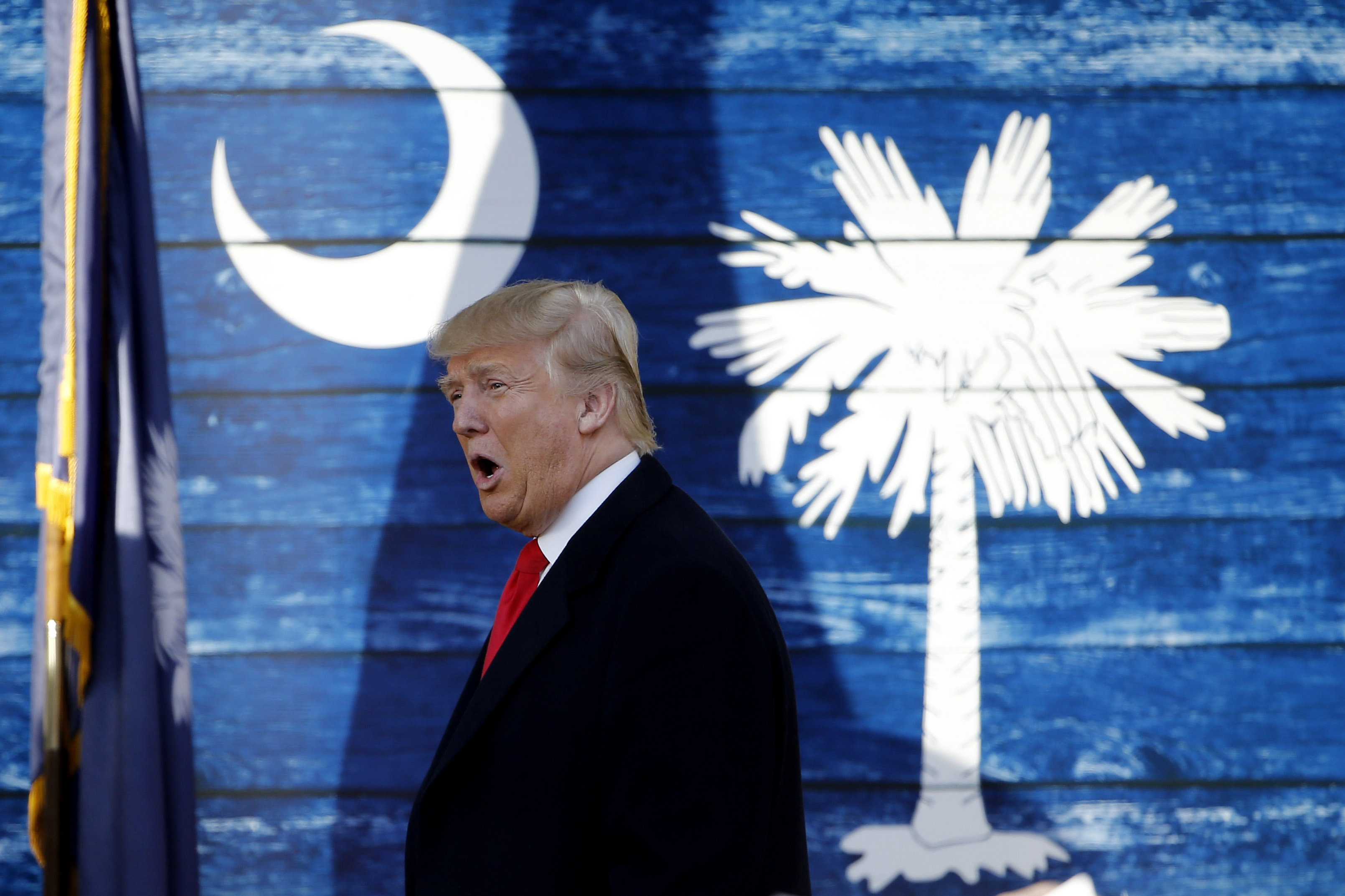How a Trump win in South Carolina could tear the GOP apart
Republicans face a crucial test in the Palmetto State this weekend


For political junkies, the past week has been among the most astonishing in a political season already jam-packed with astonishing weeks.
In last Saturday's GOP debate in South Carolina, Donald Trump took his disruptive tactics to a whole new level, laying into Jeb Bush and accusing his brother, former President George W. Bush, not just of invading Iraq for no good reason and ineptly managing the occupation of the country, but of intentionally lying to justify the war in the first place. In Trump's telling, Saddam Hussein didn't possess weapons of mass destruction, Dubya knew it, and he hyped the threat to justify a war he wanted to initiate for unrelated reasons. That's long been a trope of far-left conspiracy theorists and dismissed by mainstream Democrats and Republicans alike. Yet there was the frontrunner for the Republican presidential nomination leveling that charge from center stage of a nationally televised GOP debate.
Conservative pundits understood instantly the gravity of what they were witnessing. If a Republican candidate for president could win a primary in a deeply conservative Southern state after such an outburst, it would be the strongest evidence yet that the conservative movement had lost control of the party — that a significant bloc of its voters is ready and willing to repudiate the movement and the ideas that have defined it for several decades.
The Week
Escape your echo chamber. Get the facts behind the news, plus analysis from multiple perspectives.

Sign up for The Week's Free Newsletters
From our morning news briefing to a weekly Good News Newsletter, get the best of The Week delivered directly to your inbox.
From our morning news briefing to a weekly Good News Newsletter, get the best of The Week delivered directly to your inbox.
That's what's going to be tested this Saturday in South Carolina. A dominating victory by Trump, which most polls are predicting, will not only strongly indicate that he's likely either to win the nomination or prevent the nomination of anyone else prior to the GOP convention this summer. It will also portend a tumultuous future for the Republican Party, regardless of who ends up as the nominee in 2016. A party with such a large bloc of voters who diverge so sharply from the party's organizing ideology is either a party that will need to significantly change its ideological direction — or one on the verge of breaking apart.
Whether this is in fact what's in store for the Republican Party will be clarified as never before once the results in South Carolina roll in. And despite the occasional outlier poll, there is ample reason to think the outcome is going to be highly destabilizing to the current ideological configuration of the GOP, with Trump once again besting his rivals.
The reasons why are increasingly clear. My colleague Michael Brendan Dougherty explored some of them earlier this week. The white working-class base of the party has been devastated by stagnating wages, globalization and de-industrialization, and various forms of social and cultural breakdown. And through it all the Republican Party has offered little beyond tax cuts for the wealthy and stern, moralistic reprimands ("Stop whining and get a job!"). That's hardly a strategy inclined to generate long-term loyalty and enthusiasm for the party.
But that's just the beginning.
A free daily email with the biggest news stories of the day – and the best features from TheWeek.com
Judged by any objective standard, the Republican Party's record of governance over the past 16 years has been dismal. The largest and deadliest terrorist attack in American history took place with a Republican in the White House. He started two wars in response. The first failed for years to achieve its most immediate goal (capturing or killing Osama bin Laden) and dragged on for well over a decade, producing a deeply muddled outcome.
The second war was far more controversial. It failed to turn up the weapons that were the proximal cause of the conflict; sparked an insurgency that killed and maimed thousands of American soldiers; killed, maimed and displaced hundreds of thousands of Iraqis; and spawned groups (al Qaeda in Iraq, which later became the Islamic State and its affiliates) that now radiate destabilizing violence throughout the Middle East, North Africa, and South Asia, with carnage occasionally reaching as far as France and California.
Meanwhile, the same Republican president pushed through two massive tax cuts that mostly benefited the wealthy, inspired only modest economic growth, and did little to buoy middle-class wages. He then presided over the most severe economic crisis and collapse in seven decades.
That's an awful lot to answer for. But not even this record filled with ample doses of bad luck, missteps, and outright mistakes gets at the deepest source of present-day dissent within the GOP — which is the response of the party and its conservative-movement cheerleaders to these mistakes and missteps.
We typically think of ideology as a web of policies and the arguments that are used to justify them. But ideologies can also shape tactics. And the fact is that for much of the past generation the GOP has been in the grip of a tactical ideology of willful stubbornness. It goes like this: We believe X will produce a positive outcome of Y. If X fails to produce Y, it must be the fault of some outside force (like the Democrats). Or perhaps it didn't work out because we didn't pursue X strongly enough. So we must double-down, triple-down, quadruple-down.
Within the party's establishment, the unwillingness ever to concede an error, rethink a policy commitment, or adjust an item on the agenda feels like a show of strength, tenacity, and resolution that will always be rewarded by voters who supposedly crave flamboyant displays of toughness. But from the outside, it can look like blind obstinance, rank stupidity, a cowardly denial of reality, and an unwillingness to shoulder a rightful share of the blame.
Which brings us back to Trump.
What voters hear when he rails against the stupidity of the country's political leadership, the incompetence of George W. Bush, and what he likes to call the complete disaster of American policy in Iraq and the broader Middle East is a man willing both to face the ugly truth that they themselves perceive and to call out those who refuse to acknowledge it. If he gets a little carried away in countenancing some unsavory conspiracy theories, that's a forgivable offense. Certainly more forgivable than Republicans failing to take even the least bit of responsibility for what they've done, and failed to do, while holding positions of power.
On Saturday night in South Carolina, we'll see how many Republican voters are willing to give Donald Trump the benefit of the doubt — all for the sake of telling the party's leadership just how unwilling they are to continue extending the same benefit to them.
Damon Linker is a senior correspondent at TheWeek.com. He is also a former contributing editor at The New Republic and the author of The Theocons and The Religious Test.
-
 Political cartoons for January 19
Political cartoons for January 19Cartoons Monday's political cartoons include Greenland tariffs, fighting the Fed, and more
-
 Spain’s deadly high-speed train crash
Spain’s deadly high-speed train crashThe Explainer The country experienced its worst rail accident since 2013, with the death toll of 39 ‘not yet final’
-
 Can Starmer continue to walk the Trump tightrope?
Can Starmer continue to walk the Trump tightrope?Today's Big Question PM condemns US tariff threat but is less confrontational than some European allies
-
 The billionaires’ wealth tax: a catastrophe for California?
The billionaires’ wealth tax: a catastrophe for California?Talking Point Peter Thiel and Larry Page preparing to change state residency
-
 Bari Weiss’ ‘60 Minutes’ scandal is about more than one report
Bari Weiss’ ‘60 Minutes’ scandal is about more than one reportIN THE SPOTLIGHT By blocking an approved segment on a controversial prison holding US deportees in El Salvador, the editor-in-chief of CBS News has become the main story
-
 Has Zohran Mamdani shown the Democrats how to win again?
Has Zohran Mamdani shown the Democrats how to win again?Today’s Big Question New York City mayoral election touted as victory for left-wing populists but moderate centrist wins elsewhere present more complex path for Democratic Party
-
 Millions turn out for anti-Trump ‘No Kings’ rallies
Millions turn out for anti-Trump ‘No Kings’ ralliesSpeed Read An estimated 7 million people participated, 2 million more than at the first ‘No Kings’ protest in June
-
 Ghislaine Maxwell: angling for a Trump pardon
Ghislaine Maxwell: angling for a Trump pardonTalking Point Convicted sex trafficker's testimony could shed new light on president's links to Jeffrey Epstein
-
 The last words and final moments of 40 presidents
The last words and final moments of 40 presidentsThe Explainer Some are eloquent quotes worthy of the holders of the highest office in the nation, and others... aren't
-
 The JFK files: the truth at last?
The JFK files: the truth at last?In The Spotlight More than 64,000 previously classified documents relating the 1963 assassination of John F. Kennedy have been released by the Trump administration
-
 'Seriously, not literally': how should the world take Donald Trump?
'Seriously, not literally': how should the world take Donald Trump?Today's big question White House rhetoric and reality look likely to become increasingly blurred
